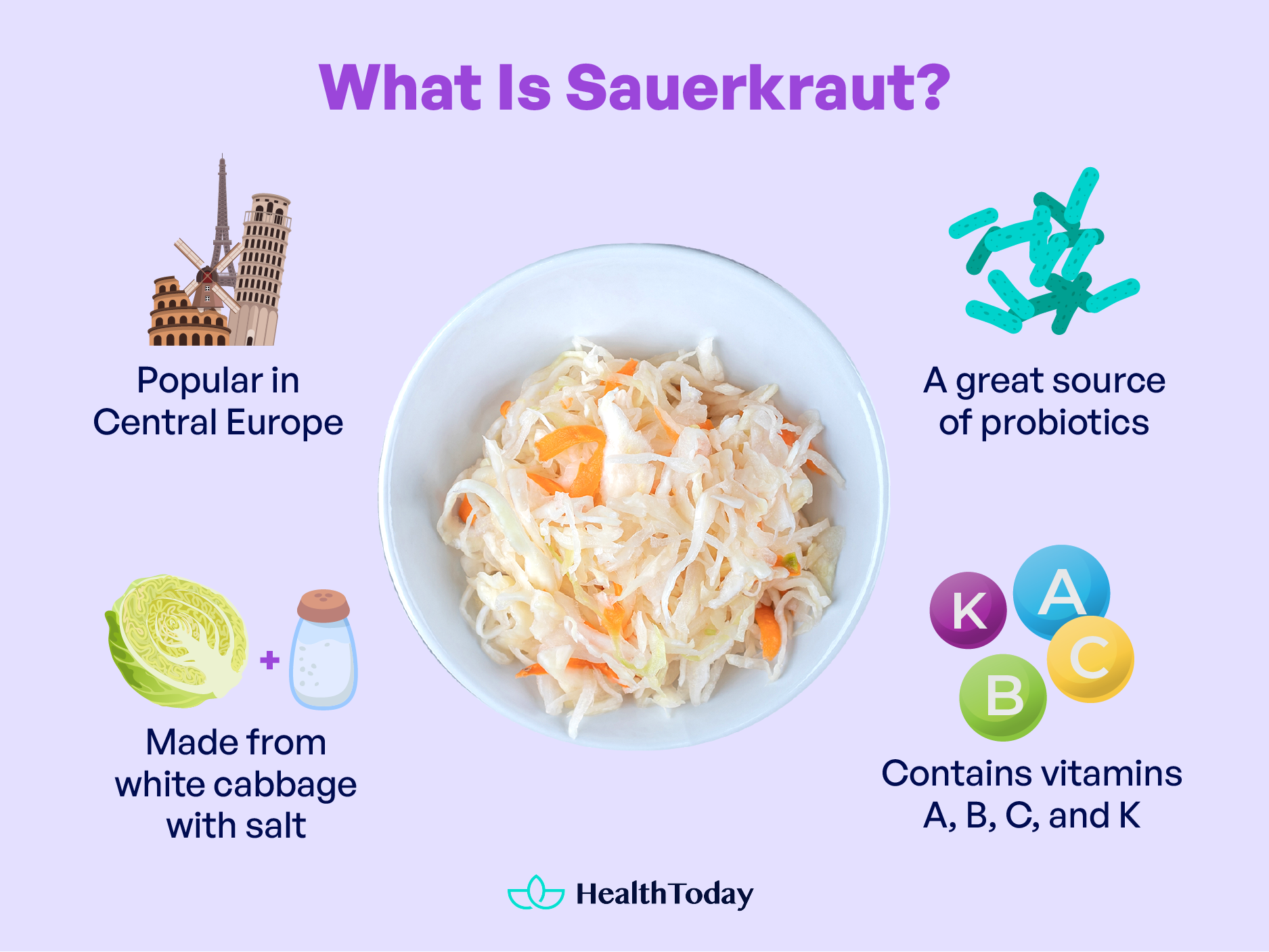Table of Contents
Fermented foods like sauerkraut have been shown to improve gut health and contribute to digestive well-being. Recognizing the significant role a healthy gut microbiome plays in overall wellness elevated it to a trending topic. This rise in popularity has led to many studies being conducted to find out what the best foods are for cultivating and maintaining the health of one’s gut bacterial community.
Today you’ll find out how sauerkraut can improve your digestive health, diversify your microbiome and other foods that will contribute to a healthier gut microbiome. Also, we will discover what is the best time to eat sauerkraut for gut health.

What is sauerkraut?
Before we dive into what it is that makes sauerkraut so good for your gut, here’s some information to help you understand what it is. The dish is made from white cabbage that is cleaned, chopped, or sliced with salt added.
Once this is done, the cabbage is massaged to stimulate liquid release and start the natural fermentation process. It’s then placed in an air-tight container where lactic acid bacteria will help this spontaneous fermentation (1). Made popular in central Europe, Germain, Alsatian, and Balkan communities traditionally eat sauerkraut.
Benefits of eating sauerkraut for gut health
Sauerkraut is beneficial for gut health for a number of reasons.
Probiotics
Lactic acid, specifically the lactobacilli strain in sauerkraut, acts as a probiotic – or live bacteria – in your gut. This beneficial bacteria supports the complex community of microorganisms in your intestines that make up your microbiome (2 , 3).
Lactic acid bacteria have also been shown to protect you from illness by binding to receptors in the gut that detect disease-carrying pathogens (4).
Vitamins
Sauerkraut also contains vitamins A, B, C, and K. When present in the gut, these vitamins help to regulate the gut microbiome and promote the diversity of the organisms living in the intestine.
By decreasing intestinal inflammation, vitamin K contributes to helping the immune system regulate while also contributing to the integrity or overall health and functioning of your gut. These effects of vitamin K on the gut are also being studied for their potential to help sufferers of irritable bowel disease (5).
Vitamin A has been shown to contribute to a healthy immune response. It also helps regulate the function of the gut barrier, which is significant in maintaining gut health (6). B vitamins help strengthen cells’ immune response while suppressing the strength of disease-carrying pathogens in your body and working to create nutrients for your microbiota to feed on (7).
Overall, sauerkraut makes a great source of probiotics that keep your gut microbiome happy, diverse, and strong, helping it fight off illness-carrying pathogens. Multiple vitamins like A, B, C, D, and a few more contribute to lower inflammation and faster immune response.

The best time to eat sauerkraut for gut health
Thinking of adding sauerkraut to your diet and wondering whether you should have it with breakfast, lunch, or dinner?
When it comes to reaping the benefits of sauerkraut in your diet, any time is a good time. Paired with any meal, the high fiber content will aid digestion of your food and create a better dining experience.


Eating sauerkraut before bed: Is it good?
Whether you have it in the morning or at night, there’s no doubt that you’ll experience the digestive rewards that come with adding fermented food to your diet. In the case of sauerkraut, studies don’t confirm a specific time when it’s best to eat the cabbage, but it is commonly consumed before a meal or alongside a meal as a side dish.
How much sauerkraut is best for a healthy gut?
While the optimal amount of sauerkraut varies depending on one’s bio-individual needs and tolerances, a study investigating the effects of sauerkraut consumption in participants with IBS, a common condition that affects the digestive system, found improvement in symptoms with consumption of 75 grams of cabbage a day for 6 weeks (8, 9). If you’re thinking of adding sauerkraut to your next meal, start with ⅓ cup and progress from there. Stay attuned to your body, as everyone’s microbiome composition is unique and varies.
What happens if you eat sauerkraut every day?
Eating sauerkraut every day can provide multiple benefits thanks to its antioxidant and anti-inflammatory properties. This dish may contribute to overall improved gut health and provide effects like:
- Lessened bloating
- Reduced immune stress (10)
- The high fiber content may improve sluggish digestion, supporting regular bowel movements.
- The anti-carcinogenic compounds may provide protection from oxidative DNA damage (11).




Other gut-friendly food options
When it comes to your diet, sauerkraut is not the only fermented or beneficial food you can add to experience health benefits. Here are eight gut-friendly foods that promote digestive health.


Kefir
It is produced by adding starter kefir culture grains to milk to create a creamy, sour, and slightly fizzy taste. The drink boasts great antimicrobial benefits thanks to the different bacterial strains, including Lactobacillus brevis, L. paracasei, L. helveticus, and L. kefiranofaciens
A study conducted over twelve weeks also showed that when kefir is consumed for this period, participants showed lower inflammation and insulin levels. The drink also helped them achieve lower blood pressure levels and better weight management (12).
These antimicrobial properties can help protect against yeast (candida) and salmonella infections. The drink has also been shown to increase the diversity of the gut microbiome (13).
Kombucha
In Northeast China, this fermented tea drink has recently become popular in the health community. It is made by fermenting black tea (occasionally green tea, too) with a combination of sugar, bacteria, and yeast, usually referred to as the SCOBY, which stands for Symbiotic Culture of Bacteria and Yeast.
In animals, the drink has been shown to reduce oxidative stress, affect diabetes-induced weight gain, and help control high cholesterol levels (12).
However, more studies on humans are needed to confirm these effects.
Tempeh
Traditionally created in Indonesia, tempeh is made by boiling fermented and dehulled soybeans using a starter culture of the fungal species Rhizopus oligosporus. This creates a soft white texture that can be cakey and have a flavor similar to mushrooms.
Studies on rats show that tempeh can aid in better digestive health, making them more regular and diversifying the gut microbiota. The same studies show antioxidant, anti-inflammatory, and anti-diabetic properties (13).
Also beneficial for cognitive function, the dish has been shown to positively affect GABA levels and vitamin b12 and b2 levels. GABA plays a role in bringing calm to the nervous system, while the vitamin B12 present in tempeh contributes to improved memory (14).
However, more studies on humans are needed to confirm these effects.
Kimchi
This Korean dish uses cabbage and other vegetables such as radish, onion, and garlic. These veggies are salted and seasoned with chili, pepper, salt, soybean sauce, and sesame seeds. Once the cabbage has been brined and drained, the other ingredients are added and allowed to ferment.
Studies conducted on the fermented vegetable dish have shown it to have weight management and anti-diabetic properties. These benefits can be linked to the benefits it provides for gut, mood, and brain health (15).
Studies on animals have shown that kimchi might contribute to weight control, immunity, and the change of genetic expression. The fermented cabbage dish has also been shown to have anti-carcinogenic and anti-inflammatory properties (16).
The anti-inflammatory effects of kimchi aren’t only taking place in the body. A study conducted on mice showed the fermented dish to protect against neuroinflammation. This inflammatory response by the brain and nervous system can occur because of an injury or infection. This inflammation can result in dementia and cognitive impairment (17, 18).
However, more studies on humans are needed to confirm these effects.
Raspberries
Raspberries are high in Vitamin C and A and contain iron and fiber. Known for its healing properties, vitamin C isn’t just good for fighting off a cold; it also contributes to increasing levels of Bifidobacterium in the gut, helping to fight infection (19).
Not only good for gut health, a study done on rats showed that ellagic acid, a phenolic compound present in the fruit, displayed anti-carcinogenic benefits. These compounds serve to protect against a range of cancers. The fruit also boasts gallic acid, an antioxidant responsible for protecting the body from heart and circulation diseases as well as age-related decline (20).
However, more studies need to be done on humans to prove these effects.
Vitamin A is known for bringing homeostasis to the gut immune system, ensuring that cells perform their functions and stay in a state of regulation (21).
Beans
Eating beans, specifically black beans, can be a great way to help regulate your gut microbiota while contributing to the growth of beneficial bacteria. The fiber content helps to promote regularity in bowel movements, and can make a great source of plant-based protein (22).
Garlic
Studies done on rats indicate that garlic has a positive effect on regulating gut immune balance. The bacteria Lachnospiraceae has also been shown to exhibit anti-inflammatory and antioxidant properties while acting as a prebiotic (23).
Further mouse studies also indicate that garlic consumption leads to an increased defense against the Helicobacter pylori bacteria, preventing the development of ulcers. It also protects against dyslipidemia, an increase of cholesterol or fat lipids in the bloodstream which can lead to heart disease or a stroke (24).
However, more human studies are needed to confirm these effects.
Bananas
Because of the resistant, indigestible starch present in unripe or green bananas, they have been shown to work as a prebiotic. These prebiotic properties help to restore gut microbiota while producing more healthy bacteria for your gut to feed on.
A study on mice indicates that green banana flour helps protect and improve the lining of their intestine, protecting against any damage done by antibiotics and leading to better recovery after sickness (25).
However, more studies on humans are needed to confirm these effects.




Why does sauerkraut only last 3 days?
Sauerkraut has been found to last anywhere from a few weeks to months, depending on whether it’s pasteurized or not. Pasteurized sauerkraut has been suggested to last longer, but this means that once it’s opened, you should eat it within 3 to 4 weeks.
Unpasteurized sauerkraut retains more of the good bacteria that get killed in the heat treatment process. This kind of sauerkraut will stay fresh for 4 to 6 months when refrigerated in between uses. You should watch out for different bacterial strains getting into your jar as they will disrupt the natural bacteria caused by fermentation and will cause your sauerkraut to spoil. Using clean utensils every time you eat it will help you avoid this.
Is sauerkraut better than yogurt for probiotics?
Yes. Sauerkraut contains more lactobacillus bacteria than yogurt, making it a better source of probiotics. To reap the benefits of sauerkraut, it’s best to eat the homemade version, sauerkraut as factory heat-treated sauerkraut kills some of those good bacteria.
Does sauerkraut clean your liver?
Because sauerkraut moderates immune functions while also enhancing your anti-bacterial response, its anti-carcinogenic properties help detoxify the body, contributing to a cleaner liver (26).
Its ability to contribute to healthy gut microbiota also reduces the burden placed on the liver (27, 28). This regulation and healthy diversity of the gut microbiota protect against the overgrowth of bacteria that result in cirrhosis. This disease replaces healthy cells with scar tissue preventing it from being able to perform its normal functions (29).
What to look for when buying sauerkraut?
Read the ingredient list the next time you’re stocking up on sauerkraut. You want ingredient lists that are as simple as possible and contain few preservatives; this helps it retain the health benefits of sauerkraut.
Summary
Although sauerkraut is a great option, this article provides you with other fermented foods that would make great additions to your next dinner. Depending on whether you choose to add sauerkraut or one of its fermented friends, you’ll likely benefit from a more diverse gut microbiome and its anti-inflammatory properties.

















Comments
0